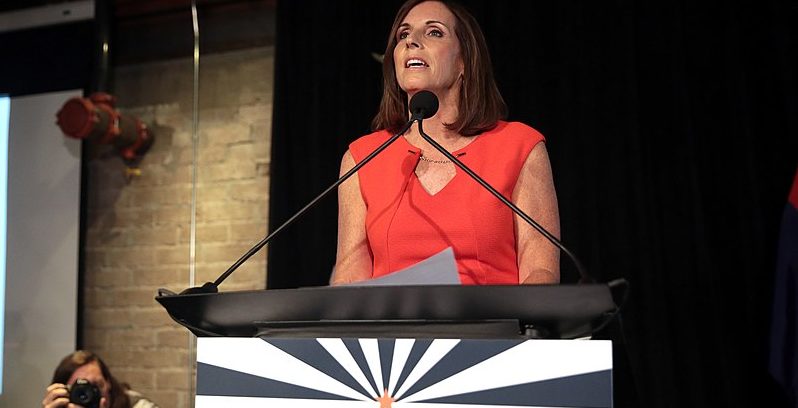Months after the Women’s March in Washington and shortly before the dawn of the #MeToo era last year, Rep. Martha McSally dismissed new sexual misconduct training for the military because male soldiers and sailors would find it to be “a waste of time” and would grow to resent their female colleagues.
McSally, an Air Force veteran and the GOP nominee to replace Sen. Jeff Flake, R-Ariz., is running during a wave of women candidates driven, in part, by the backlash against men in power who have been accused of sexual impropriety.
Several of McSally’s congressional colleagues accused of sexual misconduct have been driven from Congress since Trump’s election, and Trump’s second Supreme Court nominee, Brett Kavanaugh, is in jeopardy after a woman alleged that when he was a teenager, he and a friend attempted to rape her at a party.
But McSally has been reluctant to forcefully demand the military change the status quo to protect soldiers and sailors — both men and women — from sexual misconduct.
In 2012, nearly 2,000 Arizona service members, split equally between men and women, reported being survivors of military sexual assault. Cases of sexual misconduct in the armed services reached an all-time high nationally in 2016, when over 6,000 cases were reported.
McSally blamed “a culture of gender bias” and claimed that “double standards” favorable to women created an environment of male resentment that was the “root cause” of sexual misconduct.
In a May 2017 hearing of the House Armed Services Committee’s Military Personnel Subcommittee on sexual misconduct at military academies, McSally said soldiers didn’t want to “talk more” about how to deal with women.
“Sometimes we’re doing knee-jerk additional training,” she said, “but then, what you do is you have the guys rolling their eyes saying, ‘What a waste of our time. We should be learning how to fight and kill the enemy, and now we’re having to talk more about how to deal with women,’ and then, it pisses them off more and then that adds to more resentment.”
It wasn’t the first time McSally spoke out against “knee-jerk” reactions and “double standards” in the military.
In a March 2017 hearing of the subcommittee, McSally cautioned against implementing new training policies to address sexual violence while calling for an end to so-called double standards that favor women such as not having to cut their hair.
“I still think there is things that we all need to be addressing, that we are not inculcating any sort of subtle resentment, you know, towards the other gender,” McSally said at the hearing, “And from my view, that includes things like integration of basic training and women should be cutting their hair and not having any obvious double-standards of a different experience.”
Two years earlier, McSally voted against a bill that would have removed complaints of sexual assault from the chain of command, which she said would make commanders less responsible for the behavior of their subordinates.
Instead, she called for addressing underlying “cultural” issues in the military that allow harassment and sex crimes to perpetuate.
“We’ve got some Neanderthal people in the chain of command who now are going to feel like it’s not their problem anymore, but it is their problem,” McSally told USA Today. “It’s not just about prosecuting the crime when it happens. They need to be the ones who create a culture to make sure there’s no tolerance” for behavior she calls a “very significant problem.”

